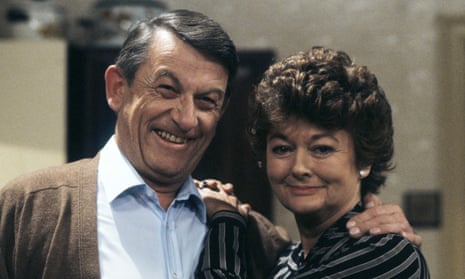The actor Sylvia Kay, who has died aged 82, spent much of her career in television drama, but found her greatest fame as Daphne Warrender, the snobbish mother of the sophisticated Penny (played by Jan Francis) in the writer John Sullivan’s sitcom Just Good Friends, in which Penny is reunited with a former boyfriend, Vince Pinner (Paul Nicholas), five years after he stood her up at the altar.
Sniping between the social classes was a crucial ingredient of the humour in the programme, which ran from 1983 to 1986. Daphne and her husband, Norman (John Ringham), who regard Vince as a wideboy and refer to him as “Thing”, look down on Vince’s father, Les (Shaun Curry), a scrap dealer who drives his wife, Rita (Ann Lynn), around in a flashy car with rock’n’roll music booming out.
Kay had previously played a parent who disapproved of her child’s choice of partner in the sitcom Mixed Blessings (1978-80). The show centred on an interracial marriage – between Thomas Simpson (Christopher Blake) and Susan Lambert (Muriel Odunton) – and although it portrayed black people with greater sympathy than had been seen in some previous TV comedies, its tone proved to be ambivalent.
In her earlier screen roles, Kay had confronted stereotypes. During her first marriage, to the director Ted Kotcheff – a pivotal figure in the development of drama on British TV – she appeared in his feature film Wake in Fright (1971), which was shot in Australia and became one of the first in the country’s new wave of movies to attract acclaim abroad, where it was originally titled Outback.
In a picture dominated by stereotypical macho men, Kay deftly portrayed a more complex female character, Janette Hynes, one of the small-town outback women resigned to a life of subservience to their hard-living, hard-drinking men. She was cast in the role only after Kotcheff auditioned dozens of female Australian actors but failed to find the sullen, sultry qualities he was looking for.
Born in Stockport, Cheshire (now part of Greater Manchester), to William Kay, a metallurgist, and his wife, Edith (nee Jones), Sylvia was brought up in Altrincham. On leaving the town’s Culcheth Hall school, she began a psychology degree at Manchester University, but left after a short time to train as an actor at Lamda in London, having been inspired by friends in the university’s drama department.
She made her professional debut with bit parts in two 1957 episodes of the popular ITV series The Adventures of Robin Hood before joining the Pitlochry Festival theatre company that year, in the days when it performed in a tent. Her first West End experience was understudying Vivien Leigh as Paola in Duel of Angels (Apollo theatre, 1957-58), taking over the role when the star fell ill. Kotcheff saw Kay’s performance and cast her as Mary Greevey in his Armchair Theatre production of Alun Owen’s play The Hard Knock (1962). Later, she was in Owen’s A Little Winter Love (1965).
During this exciting time in television drama, she also appeared in works by other emerging writers such as Clive Exton (The Silk Purse, 1959) and David Mercer (And Did Those Feet?, 1965, directed by Don Taylor), as well as several of John Hopkins’s adaptations and a 1964 episode of Z Cars written by him.
She continued her association with Taylor, who both wrote and directed, in his plays The Exorcism (1972), Dad (1976) and A Last Visitor for Mr Hugh Peter (1981), and three films for the arts series Omnibus – two 1969 dramatised documentaries on William Wordsworth and George Eliot, and The Runaway (1973), in which she starred as a fictional novelist facing moral conflicts.
In Jack Rosenthal’s 1974 TV play Polly Put the Kettle On, Kay took the title role of a woman trying to take charge of her daughter’s wedding reception as if it were her own. Then, she ventured into soap as Dorothy Lawson, landlady at 35 Mafeking Terrace, London W14, a house converted into bedsits, in the first two runs (1974-75) of the afternoon serial Rooms. Dorothy and her husband, Clive (Bryan Marshall), lived in the basement and linked the stories between the tenants who passed through.
Between 1980 and 1983, Kay popped up occasionally in the sitcom Shelley as Isobel, the argumentative, cannabis-smoking mother of the layabout played by Hywel Bennett. She returned to drama as Elsie Titmuss in Paradise Postponed (1986), the writer John Mortimer’s semi-autobiographical, 11-part family chronicle of postwar life in a British village, and its 1991 sequel, Titmuss Regained.
In the 1990s, she resumed her psychology studies to qualify as a psychotherapist and practised in London, then Hertfordshire.
Kay’s 1962 marriage to Kotcheff ended in divorce, and in 1987 she married the actor and writer Christopher Douglas. They divorced in 2008. She is survived by Aaron, Katrina and Joshua, the children of her first marriage.

Comments (…)
Sign in or create your Guardian account to join the discussion